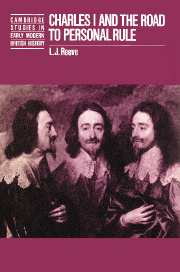Book contents
- Frontmatter
- Contents
- Acknowledgements
- List of abbreviations
- 1 Introduction
- 2 Buckingham's England in crisis
- 3 The death of a Parliament
- 4 The aftermath
- 5 Government and justice
- 6 The king, his court and its enemies
- 7 Foreign policy
- 8 Decision
- 9 The anatomy of a political transition
- Bibliography
- Index
- Cambridge Studies in Early Modern British History
3 - The death of a Parliament
Published online by Cambridge University Press: 13 October 2009
- Frontmatter
- Contents
- Acknowledgements
- List of abbreviations
- 1 Introduction
- 2 Buckingham's England in crisis
- 3 The death of a Parliament
- 4 The aftermath
- 5 Government and justice
- 6 The king, his court and its enemies
- 7 Foreign policy
- 8 Decision
- 9 The anatomy of a political transition
- Bibliography
- Index
- Cambridge Studies in Early Modern British History
Summary
The political events of 1628 had involved certain developments which had come to disturb the customary workings of English political life. These developments were even more visible during 1629 and particularly during the new parliamentary session. There was a perceptible lack of trust in the king which severely undermined the tradition of confidence in the monarch. This was linked to the increasing alienation of Charles from his own people (including his failure to attract essential aristocratic support). There was continuing debate over the character of his government, involving pressure on the customary framework of constitutional practice and thought. There was also the prospect of a breakdown in the provision of adequate war finance and therefore in the conduct of an effective foreign policy. All these elements were manifest in the session of 1629, and others would emerge in their turn with the end of the Parliament. An examination of the events surrounding the collapse of the parliamentary session suggests the elements of a new kind of politics in England.
Reports of the political scene during the weeks before Parliament reassembled confirm that Charles was leaving the principal question of policy unresolved. A Spanish agent in London wrote in the middle of December that the king seemed to favour the peace party. Another report to Spain written only nine days later, probably by the same agent, stated that Charles was thinking of continuing the war. He spent much time before the opening of the session engaged in private consultation with Carlisle. The earl tended to equivocate in matters of foreign policy and probably reinforced his king's indecision. There was very strong pressure on Charles to hold a successful session of Parliament.
- Type
- Chapter
- Information
- Charles I and the Road to Personal Rule , pp. 58 - 98Publisher: Cambridge University PressPrint publication year: 1989

